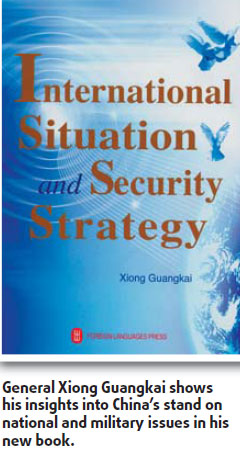General Xiong derives his interpretation of China's international strategy from his understanding of the country's geopolitics. "The world is not flat, only part of it has been flattened," he says. A country does not simply make policies out of interests alone, but has to consider both its interests and the power it possesses.
When he touches upon the topic of national security, it is not limited to traditional areas, such as a military threat. Even a decade ago, General Xiong was talking about "non-traditional security issues" like economy, energy, public health and information system, among others. Even tasks for the military have been expanded, according to Xiong, to include non-military endeavors.

Last year's lightning-fast response to the Sichuan earthquake is a perfect example of using the military in a non-traditional and non-military capacity, he says.
In a 2003 speech, General Xiong elaborated on the "revolution in military affairs", which, as he quoted Jiang Zemin, should have "Chinese characteristics". He made a detailed study of all the weapon systems used in the Iraq war by the US, coming to the conclusion of "connecting this world trend closely with our national reality" and "building a leaner but better armed force".
General Xiong often uses "military building" and "diplomacy" in one sentence. What China needs right now, he says, is to focus on its economic growth. That's why our "independent diplomatic policy" is not just for the short term. Our military building is purely "defensive", he emphasizes, and will need the full cooperation of the international community.
Xiong's speeches and articles are choke-full of valuable data, but in a sit-down interview he reveals something lighter. He mentions a discussion he held with several of the nation's top translators about a word the late leader Deng Xiaoping used as a guiding principle for China's relations with the world.
"Tao guang yang hui" is a term used by ancient strategists and is often translated as "hiding one's capacities and biding one's time". "Yang hui" is especially problematic because it can mean "lying low and concealing one's true intentions".
Xiong argues that such an interpretation, when used for China's foreign relations, could be misleading. China does not have any ulterior motives, he contends, and the reason we want to lie low is to maintain peace and harmony with everyone else.
In the end, Xiong and his fellow experts settled on an English phrase with a biblical connotation: hiding its light. And that, he believes, reflects Deng Xiaoping's true intention in guiding China toward more sustainable peace and prosperity for all.
相关阅读:
